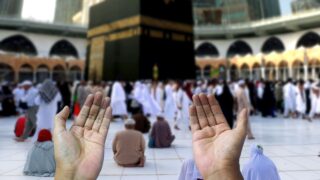Prophet Muhammad (peace be upon him) said: “I have been sent in order to perfect moral virtues (in you).” As I slip into my waning years of life and look back at all the adventures and misadventures I have been privileged to savor, I realize just how centrally important this narration is to appreciate our short sojourn on this sweet and verdant earth.
As Muslims we are meant to be an example for people on how to live well by teaching them how to measure their days. We understand life has an orientation and everything is moving towards a certain end. After a few numbered days followed by the mysterious existence in an afterlife waiting for the great resurrection there is a grand Day of Judgment. We are all then separated into those who have succeeded and those who have not.
Sound Hearts
What we bury in our hearts is thus important. To bury something does not mean it is dead. Hate, grudge, anger and pride in our hearts consume us from within and the devoured soul will have very little to be saved on that portentous day. These destructive elements always spring to life through the stimulants of negative experiences unless we have learnt to kill and wipe them out of our hearts.
The blessing of pure monotheism in our hearts produces mercy towards creation. As the Quran reminds us:
{Then will he be of those who believe, and enjoin patience, and enjoin deeds of kindness and compassion.} (Al-Balad 90: 17)
Forgetting this simple principle of Islam is at the root of our delusion that we are champions and defenders of faith while yet beholden to the vain desires. We talk about various deceptions; deceptions of glamour, of nuclear energy, of power or even of global capitalism, but hardly any of us care to mention deceptions of the self.
Self-deception is about keeping secret from ourselves the truth we cannot face. Make no mistake: the media advertises something in between the commercials. How are we then affected considering we are always so focused on correcting others but not ourselves?
{And do not follow that of which you have no knowledge; surely the hearing and the sight and the heart, all of these, shall be questioned about that.} (Al-Isra’ 17: 36)
Our rich heritage of exegetical material makes it clear that this verse forbids passing judgments without knowledge, false accusation, bearing false witness and speaking based on conjecture.
We become busy for Islam while in reality we do not see how we merely scramble to achieve an enviable image to display to others. Busyness acts to repress our inner fears and personal anxieties but worryingly, propaganda replaces intelligent thought and time becomes opportunities to avoid responsibilities, whether of learning, teaching or performing actions that build and benefit. We rhapsodize about the joy of sacrifice and striving but do not see how we become the first ones least obliged towards such. We become mired in moral laziness because we do not understand the work of the heart.
As the saying goes: “Nothing is foolproof to a sufficiently talented fool.” This is something to note so that we do not become the ‘informed ignoramus’ among us who speak about Islam without due knowledge.
Learning what to feel is one of the hardest aspects of moral education. One can know a fact and know how to act, but to know what to do; it has to come from the right motivation, whose seat is the heart – it is a feeling. When the heart does not distinguish between good and bad, there is loss of total faith. Knowing what to feel is thus the essence of educating the emotions and virtue is learnt by that.
Truthfulness, Tranquility and Humility
Truthfulness, which is a necessary prerequisite, is no more than a condition of the heart. It should be there when we speak and act. How does the heart feel at such time? Do we sense serenity and feel calmness in our hearts? After all, the Prophet did say that:
“Truthfulness is tranquility and lying is doubt.” (Muslim)
Do we perhaps confuse reactions with truthful action? Motivation and sincerity are not the issues. The real issue is whether we spend adequate time in serious, purposeful, peaceful and deep study, instead of simply reacting. By reacting in the name of Islam we only live to learn later through regret and shame, the harms and pain we thus either cause or never manage to remove, despite the best of intentions.
When Abu Bakr was dying, he reminded Omar that worshippers of God should always be in a state of hope and fear. He must have thought it important enough to have mentioned this in his parting advice. We hope that our actions are truthful and that God will reward accordingly. On the other hand, we also fear that we merely react without adequate knowledge and reverence for all that is sacred so that God is angered thereby.
Ibn Masud said: “If you intend to do something which causes you doubt, then around you there are four thousand things which does not cause you any doubt!” Much of our actions are needlessly debatable when there are many safer and surer options available to face the challenges that face us. Maybe we are too impatient and impulsively thrust forward with the irrational excuse that doing something is better than doing nothing because we really only want to follow our desires.
We are fools to repress our hearts into hardness through reactions of whim and temper when we have a serious duty to bring about peacefulness through truthful action. Just as truthful behavior is tranquility in the heart, so is goodness or good behavior.
For the heart to open the treasure chest of wisdom, it must address knowledge with humility. Ali had once said: “Do not recognize the truth through men, but recognize the truth and thereby recognize its partisans.”
When knowledge of Islam is received with humility it opens doors to recognizing the truth, then to understand one’s own inadequacies and requirements for care and appreciation of the sacred duty to absorb and grow in that knowledge.
Prophet Muhammad said:
“Every religion has a certain ethos of its own and the ethos of Islam is modesty.”
We know that Adam was not taken out of Paradise in order for it to be given to others besides human beings. When Adam found his way back to God what was it due to? Was it due to his glory since the angels bowed to him? Was it due to his honor since he was taught the names of all things? Was it because of his dignity since God fashioned him with His own hands? Was it due to his pride since God breathed into him his spirit? He got back to God simply due to humility! The Quran reminds us that they said:
{Our Lord! We have wronged our own souls: if you forgive us not and bestow not upon us your Mercy, we shall certainly be lost.} (Al-A’raf 7: 23)
Islam offers the watching world its best when the outward and the inward, the form and the content, the action and God’s revelation embrace. Islam is a choice for people. When we offer a better and more humane society-the form; with a content that does not lack in any room for the spirit to soar towards God, we are then sincerely on the road to success.
The Prophet said:
“The parable of the believer is that of a bee; what it eats is good, and what it produces is good.” (Al Albani)
Our true care for the ‘Lived Islam’ leaves us no time for an ‘Imagined Islam’. To people who live Islam, God is never a source of validation for their wicked ways but a Lord for their moral elevation.
By Abu Muntasir


















